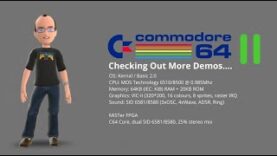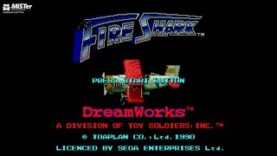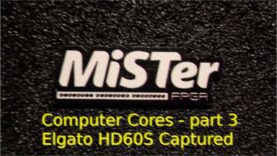Mark’s Ad-Hoc MiSTer FPGA Series – The Computer Cores – part 3 – Elgato HD60 S – Capture (Test)
Lactobacillus Prime
#MiSTer #FPGA #computer
Trying a better capture alternative using the Elgato HD60 S, it results in .ts files with variable framerate when used from within the Elgato Software which causes severe desync when trying to edit them in any video-editing tool. Why Elgato chooses to create these files is beyond me – possibly with streaming in mind. It might work better when using OBS.
MiSTer FPGA System
The MiSTer project aims to recreate and emulate a wide range of classic computer and gaming hardware using field-programmable gate arrays (FPGAs) attempting to accurately replicate the behavior of vintage hardware, allowing enthusiasts to experience retro computing and gaming on modern displays with exceptional accuracy.
The foundation of the MiSTer project is the DE10-Nano board, developed by Terasic in collaboration with Intel. One of the key differentiators of the MiSTer project is its dedication to accuracy. Unlike traditional software-based emulators that mimic the behavior of vintage systems through code, FPGAs allow for a much closer approximation of the original hardware’s behavior. This means that the MiSTer project can replicate the idiosyncrasies, quirks, and timing intricacies of the original systems with remarkable precision.
The MiSTer project has garnered a dedicated community of enthusiasts, developers, and contributors who collaborate to develop and refine FPGA cores for various systems. The community continually improves these cores, enhancing compatibility, accuracy, and performance over time.
The MiSTer project’s versatility isn’t limited to gaming consoles. It also supports computer systems like the C64, Atari 800, BBC Micro, MSX, ZX Spectrum, Amstrad CPC, Amiga, Atari ST, Sharp X68000 and even early IBM PCs upto a 486 running Windows95, turning the DE10-Nano board into a flexible platform for experiencing a broad range of computing history & gaming.
Chapters
00:00:00 – Start of the recording, booting into the MiSTer GUI
00:00:17 – Apple II Core running Boulderdash, MSPacman, Bruce Lee
00:05:32 – Acorn Archimedes running PacMania
00:08:14 – Amstrad CPC running 1943, Pacmania, P47 Thunderbolt
00:13:55 – Amstrad PCP Word Processor running Pacmania
00:15:26 – Atari 800 XL running Donkey Kong, Gyruss, Defender, MsPacman
00:23:18 – Atari ST running Buggy Boy
00:29:52 – Acorn Atom
00:31:09 – BBC Miro Model B/Master running Galaxians, Arcadians
00:32:56 – Coleco Adam
00:33:48 – Commodore 128 running VDC Demo Risen from Oblivion (v2)
00:40:30 – Commodore 16 running Venice Carneval (Fail), Uncetrain Future
00:51:56 – Commodore 64 running first seconds of Christmas Megademo 2019, Gyruss
01:02:20 – Commodore Amiga running Flying Shark
01:05:28 – Commodore VIC-20 Megacartridge Defender, Centipede, Galaxians, Frogger, MsPacman
01:12:09 – MSX (1Chip) Core – Sofarun, Spacemanbow (MSX2+)
01:17:07 – o486 PC486SX/DX Core – Windows95, Blakestone (Fail), Hexen (Fail)
01:18:56 – o486 PC486SX/DX Core – Reset, Windows95 Scandisc, Hexen (Succes), C64S Emulator
01:24:22 – PC-8801 running Galaxian, Pacman (no inputs defined)
01:27:17 – PC/XT 4.77Mhz Intel, CGA running 2088Mph Demo (Composite color artifacting mode)
01:39:07 – SAM Coupe running Spectrum Emulated game
01:39:53 – Spectravideo 328 Lunar Rescue (Tony Cruise Beta Homebrew)
01:42:00 – Sharp X68000 running Target Shmup
01:44:56 – TS-Config (ZX Spectrum3+ close) running Boulderdash (Fail), 3BM 2014 Invitro
01:48:53 – Spectrum NEXT MiSTer Core running ‘More Tea Vicar’, ScrollNutter Demo
The next videos will possibly be of better capture quality and edited showing off some of the Consoles and Arcade games.
Enjoy! Kudos to the creators of this wonderful FPGA Reproductions of these old systems on a modern day FPGA!
Thanks for watching – LactobacillusPrime
My Facebook:
https://www.facebook.com/LactobacillusPrimeRetroGaming
My Instagram:
https://www.instagram.com/lactobacillus_prime
NOTICE:
“Copyright Disclaimer Under Section 107 of the Copyright Act 1976, allowance is made for “fair use” for purposes such as criticism, comment, news reporting, teaching, scholarship, and research. Fair use is a use permitted by copyright statute that might otherwise be infringing. Non-profit, educational or personal use tips the balance in favor of fair use.”














